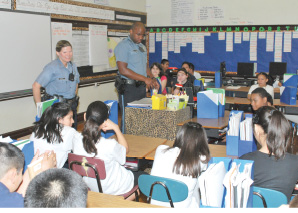
By Leslie Collins
Northeast News
April 27, 2011
“Sticks and stones may break my bones, but words will never hurt me.”
It’s a catchy adage, but far from the truth.
In the era of Facebook, Myspace and texting, words are packing more power and widespread damage.
Recently, CNN featured a high school in Massachusetts where a student or students sent out Facebook messages to classmates listing girls who still needed a date to prom. The messages rated the 22 girls on their appearance and dating experience.
It can all be summed up in one word: bullying.
“I think it’s important for kids to understand how dangerous bullying actually is,” said Officer Antonio Hill of Kansas City Missouri Police Department’s East Patrol.
Both Hill and Officer Sutton McCrea of East Patrol recently talked to James Elementary School sixth graders about bullying. Since February, the two officers have been visiting the schools in East Zone on a weekly basis to help students see police officers in a more positive light.
“I’m getting a lot of positive feedback from the schools,” said East Patrol’s Maj. Anthony Ell. “The bullying program is so important, particularly at a young age, because you form the foundation to help kids have the decision tools and moral compass to make better decisions when they are put in difficult situations.
“If we equip them with those tools, we’re not going to have so much violence later on.”
“It’s so different today,” McCrea said of bullying. “When I was in school you maybe wrote a note, but now they have the Internet, cell phones, so many different avenues (to bully someone).”
When the officers asked the sixth graders how many of them use Facebook or MySpace, about half of the students raised their hands. Approximately 70 percent said they had a cell phone.
While the sixth graders listed forms of physical bullying, McCrea pointed out it also includes cruel teasing, spreading rumors and messages through Facebook and texting.
“It’s called cyber bullying,” Hill told the class.
For Hill, bullying hit home in more ways than one.
In high school, Hill was the typical jock. He liked showing off in front of his friends, sometimes at the expense of others. While his intentions were never cruel, he said, “I looked back and thought, ‘Man, I’ve said some hurtful things to people.”
He apologized to several classmates during his 10-year high school reunion.
In college, he continued to play football, and in 2003, a teammate and close friend committed suicide.
“We’ve got people taking their life because people are making fun of them,” he told the sixth graders. “He (teammate) never talked about it. In his (suicide) letter, he stated, ‘I can’t take it anymore. I’m tired of getting made fun of.’ I had no idea he felt like that.”
His teammate, a 6’2″, 190-pound football player, had been suffering inside.
Just because someone is physically strong on the outside doesn’t mean their feelings can’t be hurt, he said.
“Think about what you’re doing and how it makes the other person feel,” McCrea said. “Put yourself in their shoes.”
McCrea and Hill said they probably didn’t reach every sixth grader that day, but if their presentation positively affected one person, it was worth it.
Above: Officer Sutten McCrea, left, and Officer Antonio Hill of Kansas City Police Department’s East Patrol listen to students’ feedback during their bullying presentation. Leslie Collins















